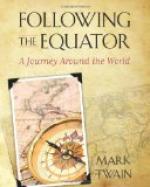I am sorry to hear her say that. I myself blame him for one thing, and severely, but I stop there. I blame him for, the indiscretion of introducing a novelty which was calculated to attract attention to our civilization. There was no occasion to do that. It was his duty, and it is every loyal man’s duty to protect that heritage in every way he can; and the best way to do that is to attract attention elsewhere. The squatter’s judgment was bad—that is plain; but his heart was right. He is almost the only pioneering representative of civilization in history who has risen above the prejudices of his caste and his heredity and tried to introduce the element of mercy into the superior race’s dealings with the savage. His name is lost, and it is a pity; for it deserves to be handed down to posterity with homage and reverence.
This paragraph is from a London journal:
“To learn what France is doing to spread the blessings of civilization in her distant dependencies we may turn with advantage to New Caledonia. With a view to attracting free settlers to that penal colony, M. Feillet, the Governor, forcibly expropriated the Kanaka cultivators from the best of their plantations, with a derisory compensation, in spite of the protests of the Council General of the island. Such immigrants as could be induced to cross the seas thus found themselves in possession of thousands of coffee, cocoa, banana, and bread-fruit trees, the raising of which had cost the wretched natives years of toil whilst the latter had a few five-franc pieces to spend in the liquor stores of Noumea.”
You observe the combination? It is robbery, humiliation, and slow, slow murder, through poverty and the white man’s whisky. The savage’s gentle friend, the savage’s noble friend, the only magnanimous and unselfish friend the savage has ever had, was not there with the merciful swift release of his poisoned pudding.
There are many humorous things in the world; among them the white man’s notion that he is less savage than the other savages.—[See Chapter on Tasmania, post.]




